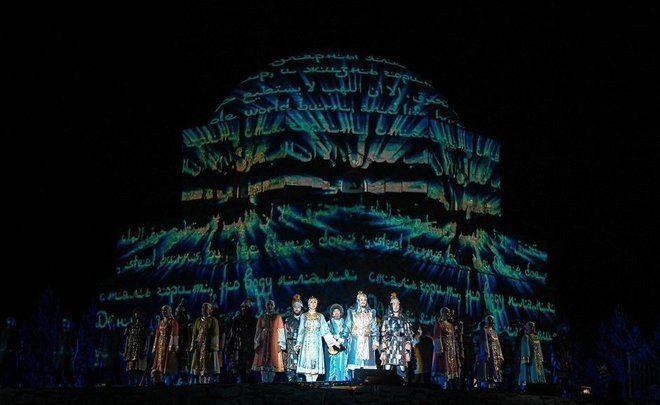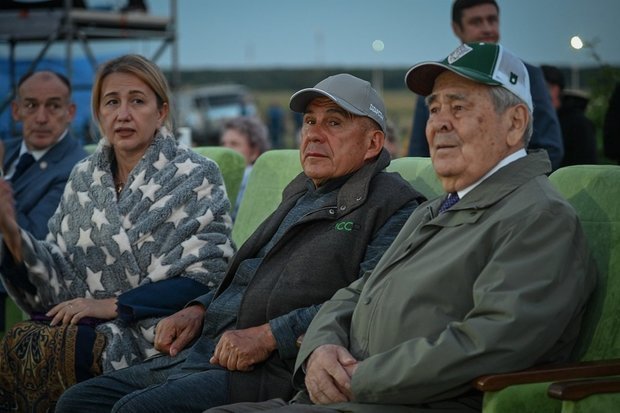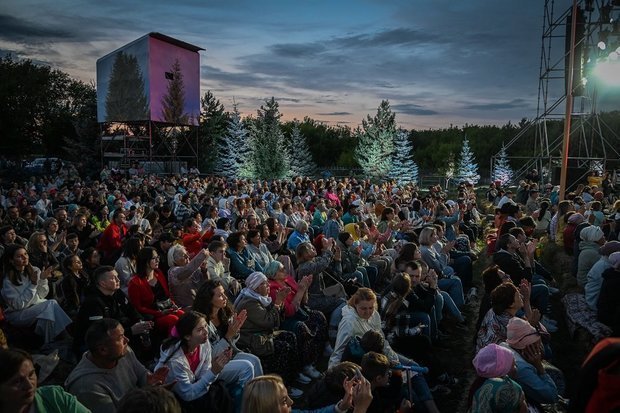Mintimer Shaimiev: ‘Bolgar was tormented, robbed, but it was reborn again and again’
Work is underway to add the fourth object from Tatarstan to the UNESCO list

The nine-day festival Renaissance: Epic in Modern Interpretation has finished in Bolgar. The opera “Kara Pulat”, which closed the festival, was visited by the rais of the republic, Rustam Minnikhanov, and the state counsellor of the Republic of Tatarstan, Mintimer Shaimiev. The Black Chamber itself, a unique monument of the Golden Horde architecture of the XIV century, turned first into a podium, and then into a stage.
“Beautiful festival, beautiful outfits”
An hour before the start of the opera, an ethno-fashion show of designers from Tatarstan, Bashkortostan, and Uzbekistan took place here, at the foot of the Black Chamber. Rustam Minnikhanov, commenting on the show, noted: “A beautiful festival, beautiful outfits!”
At the show, in particular, collections of Tatar designers Sultan Saliev, Elari Shaykhi, and Ruslan Gabdov were presented. The latter, by the way, the only one out of 40 designers, demonstrated an exclusively men's collection called Mukhtabar, which represented the jackets of the Jadidism era. Exactly the same ones that Fatikh Amirkhan and Gabdulla Tukay sported.
As for the festival itself, Rustam Minnikhanov noted that every year “the festival gains momentum and becomes in demand”.
Tatarstan State Counsellor Mintimer Shaimiev dedicated three days of his life to the festival. The first president of Tatarstan opened the festival a week ago, visited ethno-fashion shows on Saturday and the opera “Kara Pulat” on the last day of the festival. As a result, Shaimiev watched three theatrical productions out of five presented in Bolgar.
The state counsellor of Tatarstan recalled that during the days of the festival, epics, legends, tales of different peoples were read by our contemporaries on the land of the ancient capital of the Volga Bulgarians.
“The idea of organising the festival Renaissance: Epic in Modern Interpretation arose exactly a year ago, when we listened to the opera “Kara Pulat” at this place. We witnessed this phenomenon. This opera legend is a perfect reflection of the meaning of our festival today, because the libretto of this epic opera is based on a modern interpretation of legends and tales relating to the Bulgarian period of the history of our region and the Tatar people," he said.
According to Shaimiev, epics, legends, and epics contain the centuries-old wisdom of peoples, which does not lose relevance and is always ready to help people, peoples, and countries.
“It is only necessary to know how to use this wisdom for the benefit of people, peoples and states. The essence and meaning of our festival is precisely this. We have started a new stage — spiritual rebirth. Our epoch is a time of active dialogue of cultures of different peoples, nations and ethnic groups, a time of exchange of historical experience, a time of the need for mutual understanding, therefore, the dialogue of cultures, especially in our multinational, multi-confessional Russia, is of enormous importance," Shaimiev added.

“Tatarstan is working on the inclusion of the fourth site in UNESCO”
As for the festival itself, the State Counsellor of Tatarstan drew attention to that all those gathered today are witnessing “a great movement in the restoration of their past”.
“This is a new approach. We are moving from the material to the spiritual rebirth of this land. And we will consistently deal with this," he stressed.
It should be noted that the day before, welcoming artists from Yakutia, Shaimiev mentioned that at the moment work was underway to add a fourth object from Tatarstan to the UNESCO list (three — the Kazan Kremlin, Bolgar and Sviyazhsk — are already UNESCO sites). However, he did not specify which object the republic wants to include in the UNESCO list.
By the way, during the festival, Bolgar became the focus of UNESCO intangible cultural heritage objects: the Kyrgyz epic “Manas” is a UNESCO object and is also listed in the Guinness Book of Records as the most voluminous epic in the world. The Yakut theatre Olonkho is the bearer of the epic “Olonkho”, which, in turn, is an intangible cultural heritage of mankind and a UNESCO masterpiece. Tajik designer Khurshed Sattorov used in his collection, which he presented as part of an ethno-fashion show, traditional Tajik embroidery “chakan”, included in the representative list of the intangible cultural heritage of mankind.

“Bolgar was reborn again and again”
Welcoming the audience, Shaimiev also gave a small historical excursion:
“As you know, the history and fate of the Ancient Bolgar, where we are now with you, is complex and not simple. Bolgar was tormented by Batu Khan's hordes, was robbed by Ushkuyniks, Tamerlane's troops were marching, but it was reborn again and again. The opera “Kara Pulat” presented today just tells about the attack on Bolgar by the Samarkand emir. In my opinion, the opera “Kara Pulat” is a worthy completion of our unique festival this year, which, of course, will have a continuation. With its content and scale, it opens up new horizons for us in the way of preserving the intangible cultural heritage of our peoples. Thank you to everyone who has come to this holy land to share with us the joy of beginning to gain spirituality and awareness of the significance of cultural heritage," Shaimiev summed up.
Among the audience, there were also the Minister of Culture of Tatarstan Irada Ayupova, Professor of the Ufa State Academy of Arts Idris Gaziev, composer of the opera Elmir Nizamov, and actor of the Almetyevsk Theatre Rafik Tagirov, who played in Ilshat Rakhimbay's film “Mikulay”. The audience seemed to be glad to see the latter no less than opera soloists Ilyusa Khuzina, Ilgiz Mukhetdinov, and Artur Islamov.
According to the organisers, 1,5 thousand people gathered to watch the open-air opera. Simultaneously with the show in Bolgar, an online broadcast of the show was organised. It was viewed by about a thousand people at the time of publication.